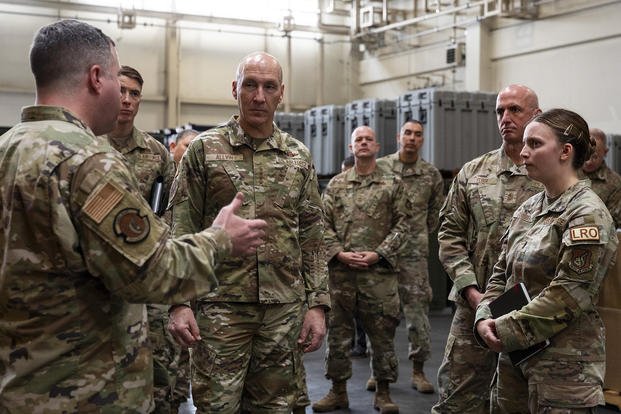
Air Force Chief of Staff Gen. David Allvin told airmen in a new memo that there’s still a lot of work to do as the service undergoes a major organizational change, a message that notably comes with a presidential election looming just two weeks away.
Allvin, who is coming up on one year as the service’s top uniformed leader, told airmen in the memo — shared with Military.com and circulated Tuesday — what is in the works and what has been accomplished with the service’s wide-ranging changes and organizational shifts, which were announced publicly earlier this year.
“This year has been both sobering — as we come to grips with the magnitude and consequence of our changes — and invigorating — as we see the energy and commitment to change throughout our formation,” Allvin wrote in the memo.
Read Next: Navy Submarine Honored with Top Unit Award for 3 Secret Intelligence Missions
One of those new initiatives, which was first reported by Military.com earlier this year, involved reinstating and bringing back warrant officers — solely focused on cyber career fields — for the first time in decades.
Allvin, in his Tuesday memo, told airmen that the first class of warrant officers started earlier this month and are slated to graduate in early December. He added that a second class will start promptly in January.
He also pointed out that the service is currently elevating numbered air forces — which are beneath major commands — to service component commands that will report directly to the Air Force secretary through the Air Force chief of staff.
Air Forces Southern, or AFSOUTH, was elevated to the new level last month. Allvin added in the memo that Air Forces Northern, Air Forces Central and Air Forces Cyber will “follow suit in the future.”
Allvin also highlighted changes he is making for airmen and their families, such as expanding the quality of Child Development Centers on base, saying that “staffing levels rose from 80% to 85%” in the past six months.
Allvin also pointed to an effort started prior to his tenure, which worked to place all the resources for victims’ services — ranging from domestic and sexual abuse response to religious support and legal assistance — in one central base office to cut down on service members having to chase down the proper help on base.
Military.com reported that a pilot program last year tested out the idea at several bases, but Allvin said the Department of the Air Force plans to “launch co-location implementation at additional installations” in the coming year.
Allvin’s memo to the force comes a little more than a week shy of his one-year anniversary in his role and just two weeks ahead of Election Day on Nov. 5.
Lawmakers, government watchdogs and defense policy experts all told Military.com last month that there were significant doubts about the longevity of the Department of the Air Force’s reorganization plans — pointing out that they could be upended by a new president in the White House.
Diana Maurer, the director in the Government Accountability Office’s Defense Capabilities and Management team who oversaw a congressionally requested report into the reorganization, told Military.com last month that “the proof is going to be in the pudding about where these initiatives are going to be in six months, 12 months, 24 months. …”
Allvin, however, told Military.com last month that he believed he had buy-in from Congress on the changes and didn’t seem overly concerned. In his Tuesday memo, the Air Force chief of staff doubled down on the progress being made but also said “we have a lot more work ahead of us.”
“I look forward to what our team will accomplish next,” Allvin wrote. “Let’s keep the momentum going!”
Related: The Air Force Unveiled an Ambitious Reorganization Plan. Can It Survive a Presidential Election?






